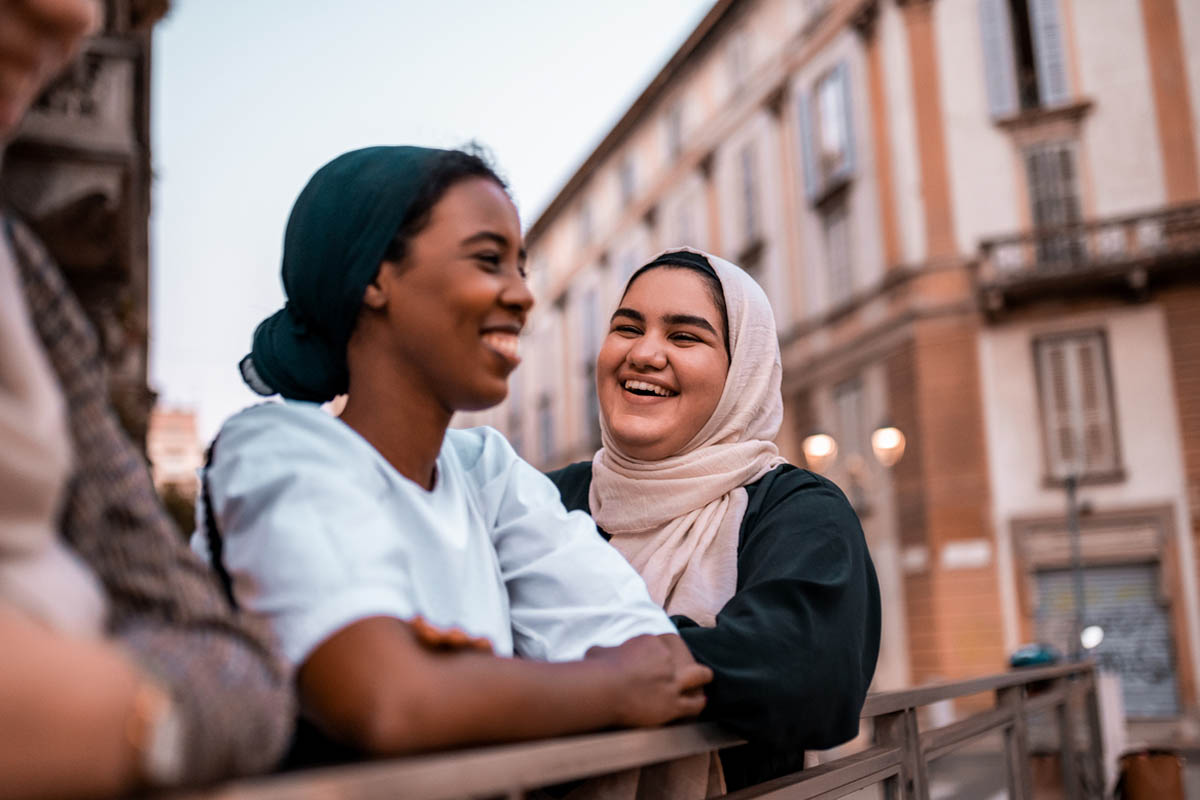Peacebuilding Practices: Part 1 – Friendship and Relational Space as a Foundation of Peacebuilding

Welcome to a three-part series on peacebuilding practices at Hartford International University for Religion and Peace. A central aspect of peacebuilding is prioritizing relationships over agreement. Difference and diversity are desirable and healthy, and even conflict over difference is normal. However – and it hardly needs to be said – violence, prejudice, and oppression are not okay. How do we embrace the differences that come with diversity? We invest time and energy in prioritizing relationships. This week we’re talking about Relational Space. If this is a new term for you, read on! Over the next two weeks we’ll look into Paraphrasing as an everyday skill for building understanding, and Dialogue methodologies to dig into tough subjects.
Doaa Baumi, a Muslim woman from Cairo, Egypt, and Elena Dini, a Catholic woman from Rome, Italy, are good friends. They became friends through proximity at HIU (then Hartford Seminary) where they were assigned to live in the same residence as International Peacemaking Program students. When asked what drew them together, Elena says, “I think it was everyday life. It was being together, sharing the space, studying the same subjects, just starting to talk more with each other. Daring to ask questions we didn’t dare ask other people.”
Relational Space in Peacebuilding
Doaa notes that though she had previous friendships with people of other faiths, she had never before shared living space with someone of another faith. She says, “What is interesting about this friendship is that we were open to discussing deep questions about our religion and the way we practice it. We were also able to observe one another, and since we shared the same flat, we got many chances to observe and to ask.” This is relational space in action: people from different backgrounds getting to know each other in meaningful ways.
The term relational space comes to us from master peacebuilder John Paul Lederach. In his discussion of how peacebuilding is like spinning a spider web, he says, “Peacebuilders, no matter their location or persuasion, must eliminate the erroneous notion that change can happen independently of people who are not of common mind and are not located in similar social, political, or economic space. Web-making suggests that the net of change is put together by recognizing and building relational spaces that have not existed or that must be strengthened to create a whole, that like the spider’s web, makes things stick.”1
Diversity is natural and desirable, but it isn’t easy. Where relationships exist, understanding can grow. Where there is understanding, solutions can be generated. When a solution needs to change – and ultimately every accord must adapt to new circumstances – those not-like-minded, not-like-situated people who have prioritized their relationship have the capacity to adapt together.
Importance of Friendships to Building Peace
HIU has long been a relational space – a spider’s web of interreligious and international connections where friendships that transcend differences are forged in the classroom, the student residences, and the surrounding community. The importance of friendship to peacebuilding, especially friendships among diverse individuals, cannot be overstated.
Listen to what Elena has to say about her friendship with Doaa: “Having a friend of a different faith was opening me to consider things in a different light. … That was so important. It opened me up to the idea that God is great, God is larger than my own understanding, larger than the human understanding of my own faith tradition.”
Their friendship was sometimes tested by hard conversations. Elena recalls discussing serious social issues where Doaa’s perspective was dramatically different than her own. “It was not always easy to understand, but I loved her so much that I wanted to understand. … Our friendship made me [recognize] both differences and similarities. Both were there, both were at some points challenging and at other points reassuring.”
Peacebuilding is justice-oriented and relationship-based. It is through strong relationships, like Elena and Doaa’s, that we are motivated to do the hard work of understanding others and finding peaceful ways to work through our differences.
These sorts of relationships don’t just happen. Not every place where different people mingle is a relational space. My local Stop & Shop has an increasingly diverse clientele, but it is a rare individual who crafts a profound friendship at the grocery store. Hartford International University has spent decades building and mending our spiderweb of interfaith relationships. It is because of this hard work to be a relational space that we are, indeed, “for Religion and Peace.”
About Hartford InternationalAs a pioneering, interreligious, international university, Hartford International has helped thousands of people find peace within, and many thousands more find peace with each other. At HIU, we engage in robust religious studies, including a Master of Arts in International Peacebuilding, and meaningful interfaith dialogue to deepen our beliefs, respect our differences, and help bring peace to the world.
1Lederach, John Paul. The Moral Imagination: The Art and Soul of Building Peace, Oxford University Press, Oxford, 2005, pp. 84–85.
Tags: friendship as a foundation to peacebuilding, relational space in peacebuilding
